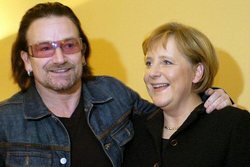Bono to steal G8 show again
Caroline Bock
BERLIN
03-Jun-07
BONO, the Irish singer who will sing at an anti-poverty concert next week to protest at the policies of the richest nations, certainly gets around.
Last year he was photographed shaking hands with United States President GW Bush. Hardline protesters were scandalised, but the U2 star says he would sup with the Devil himself to help the cause.
The June 7 “Raise Your Voice Against Poverty” concert in the German city of Rostock has been dubbed the P8, or Poverty Eight, a joke on the G8 or Group of Eight summit.
Like another Irish star, Bob Geldof, Bono is dedicated to relieving poverty in Africa and fears the G8 nations offer too little help or may wriggle out of existing promises.
The stars, and any visitor to the multilingual P8 website deinestimmegegenarmut.de, can send German Chancellor Angela Merkel an e-postcard warning her to “keep her word” at the June 6-8 summit in Heiligendamm.

Celebrity protest is something new to serious-minded Germany, where protest movements often come with a complete world-view and are suspicious of elites.
Two quite different sorts of singer perform against globalisation.
One category is the voice of the German hard left, which objects to the existence of the G8, accusing the seven western nations and Russia of oppressing the world.
A Berlin festival in April, the Move against G8, and gigs by Hamburg musicians Jan Delay and Bernadette La Hengst appeal to radicals who aim to disrupt the summit.
Stars like Bono and Geldof belong to a category that could be described as pragmatist rather than leftist: they stress that world leaders need a push to save the world.
Many in the protest movement appreciate the star presence, because it diverts the attention of the media away from preening politicians towards the anti-poverty message.
“We call it the redistribution of the cameras,” quips Tobias Kahler of Data, an anti-poverty campaign group that welcomes star backing, in a play on the phrase “redistribution of wealth”.
Geldof is set to win huge attention in Germany as guest editor-in-chief of Bild, Germany’s biggest-circulation newspaper, giving it a temporary makeover which will include a series of stories about Africa.
The German-language Vanity Fair has done a glossy cover with Claudia Schiffer, Orlando Bloom, George Clooney, Heidi Klum, Salma Hayek, Penelope Cruz and P Diddy wearing white “Raise Your Voice Against Poverty” armbands.
In an interview with the German weekly Die Zeit, Bono said: “What does it matter what their motivations are if the ideas are right?” That is a point of view that dismays some deeply serious German activists.
“I find the whole thing ambivalent,” said Peter Wahl, coordinator of the European anti-globalisation network Attac, recalling the Live 8 concerts at the time of the 2005 Gleneagles G8 summit, when Geldof said the battle on poverty had been almost won. That proved premature.
On the other hand, it was a good thing to have as much influence as possible on the side of those who view globalisation critically, said Wahl, whose group has also benefited from a celebrity or two in its ranks.
Simon Teune, an academic who studies protest at the Berlin Studies Centre, says a survey of several campaigns shows that “the original objectives of civic movements get watered down whenever celebrities come on board”.
The faces tend to package their social criticism in a generalised way and to drop the radical edge.
“They say they are against poverty. So what? Do you know anyone who is in favour of poverty?” he said.
The celebrities focus on phenomena that can readily be portrayed as scandalous, but do not point any finger at the political and social causes of the crises, he said.
“That is why a majority of the critics of the G8 are not too rapt about all the celebrities jumping in to lend their support,” Teune explained.
DPA
Images:

/




